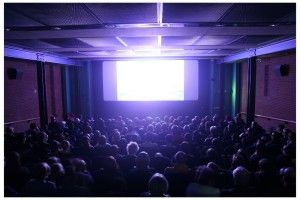In a recent seminar in Dundee Contemporary Arts (DCA), SURF brought together a range of experts to explore Bridging Culture and Regeneration. At the time of the event, DCA was bustling with enthusiastic schoolchildren attending its popular youth-targeted international film festival. In this feature, DCA Director Clive Gillman, a participant in SURF’s seminar, highlights contrasting responses to one screening, and discusses the value of cultural centres embracing and showcasing challenging art.

DCA’s ‘Discovery’ festival screenings are well-attended
I work in the office furthest from the front door. My view is southwards across the car parks at the rear of our building and towards the multi-storey car park that now hides the view to the River Tay. I think it’s therefore good to occasionally take some time to step outside the office door, perhaps to hover behind the reception desk and see what’s happening out there. Out there it’s possible to watch people come and move through the building. To get a sense of what puzzles them, of what interests them, and often what irks them.
We have around 350,000 visits a year at Dundee Contemporary Arts – that’s quite a lot of people to watch and also quite a lot of people to please. One event that sees a lot of activity at the front desk is also one of our favourite events in our annual programme. It is the international film festival for young audiences that we stage each autumn.
Called ‘Discovery’, it is intrinsically linked to Dundee – the city of Discovery – in that it aims to introduce the young audiences from our city to a broad spectrum of films from different places, with different kinds of stories and different viewpoints.
INT. DCA FRONT DESK – DAY
A few years ago, we secured a premiere screening of a film from the Netherlands called ‘Knetter’, which was retitled ‘Bonkers’ for its English language version.
This was never a film that was likely to have a mainstream release in the UK. Perhaps its presentation at DCA would be the only opportunity anyone in the UK would have to see the film in a cinema. The film was the story of a young girl who lived with her grandmother because her mother lived with a mental illness that meant her behaviour was chaotic and unpredictable.

The festival has been running for over 10 years (Credit: Kristen Baikie)
I had watched the film and met the Director and its young child star. The film was stylish, funny, warm-hearted, and did not shy away from the stresses experienced by people living with mental illness.
The film pulls no punches. About 15 minutes in, the grandmother gets knocked down by a car and killed. This is followed by a scene in which the young girl climbs into bed with her dead grandmother to give her one last cuddle. Our cinema is one flight of stairs down from our Front Desk and shortly after this scene appeared on the screen I was confronted by an irate parent climbing these stairs.
Disgusted by what she had seen on screen, she had walked out of the cinema and arrived at the Front Desk demanding to know why we had chosen to show such shocking scenes in a film for children. I was polite, I was apologetic for her upset, and I was disappointed that the emotional intensity of a scene like this was too much for this person. We talked it over and she left, perhaps regretting her foray into international children’s cinema.
CUT TO ALT. POV
I waited on and thankfully there were no more walkouts. When the film finished I watched as the crowd drifted out. A mix of young and old, they seemed to be occupied with the film’s climax in which the mother steals a circus elephant to try and win back the affection of her daughter.
As I watched I noticed one of the Ushers pointing me out to a woman who was hovering outside the cinema. She crossed over to where I was standing and in stark contrast to my earlier experience smiled and said to me: “Thank you for showing that film. I have a daughter who is just like that and I have to look after my granddaughter. I never thought that I would see our life celebrated in this way as something complicated and difficult, but also funny and life-affirming.”
It was one of those rare moments where intent and outcome come together in a ringing celebration of cultural confirmation. I wanted to hug her, but I work mainly in the visual and media arts and we don’t do that sort of thing.

DIRECTOR’S COMMENTARY
The purpose of the film was never to simply affirm the existence of those living with mental illness. That would be didactic and that rarely makes great art. It was a good story, well told and funny. But the journey to that place where stories expand our world and include new inclusive narratives is without doubt why we show these kinds of films.

As well as screening new films from around the world, the festival also features workshops & events (Credit: Kristen Baikie)
However, our fear of the first parent means that the joy of the second is often withheld and that is something we cannot afford to do. We build cultural centres not just to confirm that we are the kind of people who go to cultural centres, but to show things without fear that challenge our understanding of the world and which do it with wit, passion and humour.
This woman and her granddaughter had had their existence brought in from the margins, placed on a 45ft widescreen and presented as another part of our complex and sophisticated existence – as funny and strange and alive as anyone else.
Not all of our cultural experiences can do this in such a direct way, but to know that we have places where these steps can be taken fills me with hope.
